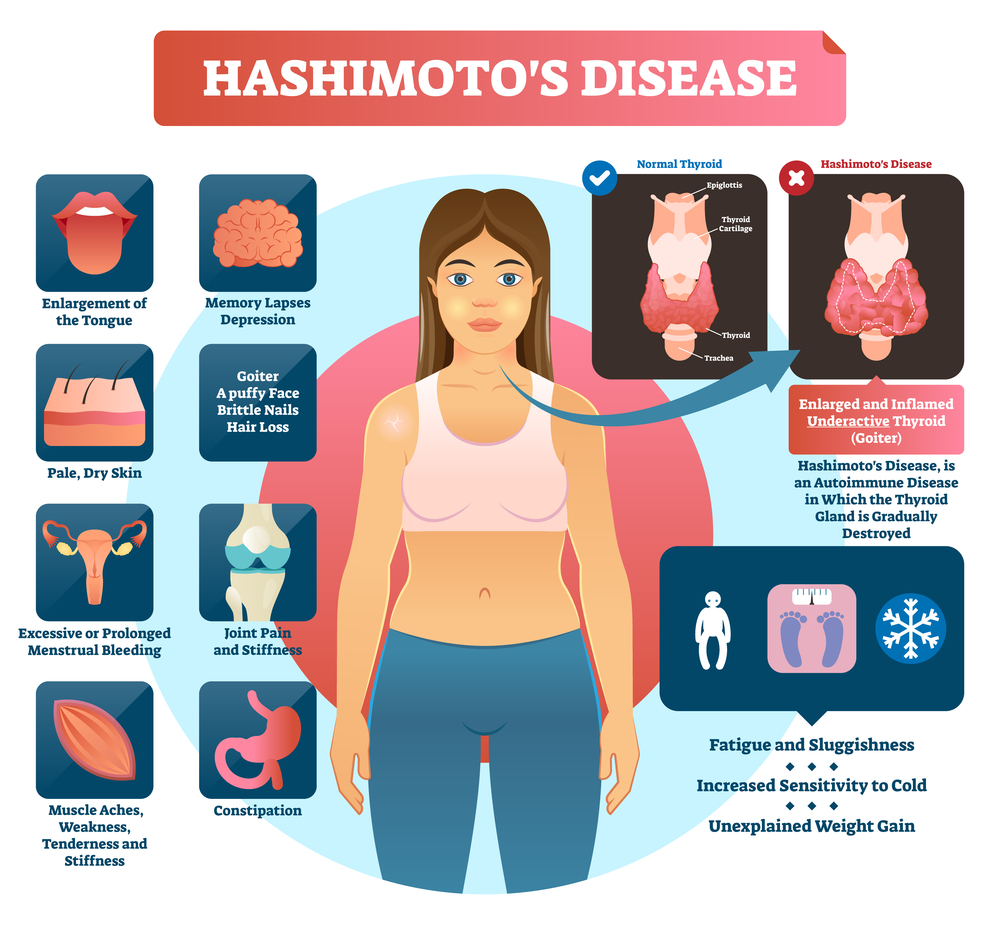Learning to Live with Hashimoto’s Thyroiditis
Hashimoto’s Thyroiditis is the leading cause of hypothyroidism. It’s responsible for more than 90% of cases. If you’ve been diagnosed or think you may be at risk, there are medical treatments and lifestyle changes that can help you to manage underactive thyroid symptoms.
Hypothyroidism develops when your immune system mistakenly targets healthy cells.
This autoimmune disorder interferes with thyroid function and causes chronic inflammation.
Eventually, your thyroid gland may be unable to produce enough hormones for its usual functions. That includes regulating your metabolism and body temperature.
With smart decisions, you may be able to avoid the weight gain and fatigue often associated with an underactive thyroid. Learn more about how to live with Hashimoto’s Thyroiditis.
Lifestyle Tips for Hashimoto’s Thyroiditis:
- Eat clean. Ultra-processed products are a major source of inflammation. Plan your meals and snacks around natural whole foods. Fill your plate with vegetables, fruits, and whole grains. Choose healthy fats and lean proteins.
- Manage food sensitivities. Certain foods may add to your digestive troubles. Common culprits include dairy products, eggs, peanuts, and caffeine. Try removing them from your diet one at a time to see if it makes a difference.
- Avoid gluten. This protein found in wheat and other grains is more likely to trigger an immune response if you have a medical condition such as Hashimoto’s Thyroiditis. Check food labels and buy a cookbook that will teach you about gluten substitutes and foods that are naturally gluten-free.
- Exercise regularly. Working out can give you more energy. It may also help to relieve depression, stiffness, and other symptoms of Hashimoto’s Thyroiditis.
- Protect your joints. While physical activity is beneficial, it’s important to avoid overdoing it, especially if you experience muscle and joint aches. Listen to your body and schedule rest days. Try low impact activities such as swimming and biking.
- Lose weight. Slimming down can be more challenging when you have a thyroid condition. However, it’s important because those excess pounds can aggravate your symptoms. Follow a sensible diet and workout plan and talk with your doctor if you need more help.
- Sleep well. Adequate rest helps your body to heal. Aim for 7 to 8 hours of sleep each night and stick to a consistent bedtime.
- Reduce stress. High levels of cortisol and other stress hormones can block thyroid hormones and increase inflammation. Find relaxation practices that work for you or talk about your feelings with a trusted friend or family member.
Medical Treatment for Hashimoto’s Thyroiditis:
- Know your risks. Women are seven times more likely than men to develop Hashimoto’s Thyroiditis. Other risk factors include your family history or having other autoimmune conditions.
- Get diagnosed. You may not notice thyroid symptoms because they develop slowly. Some signs may include weight gain, fatigue, constipation, mental confusion, and mood changes. Your doctor can give you a physical exam and test your thyroid function and antibody levels.
- Take medication. If your thyroid function is normal, your doctor may suggest a wait and see approach that will include testing at regular intervals. Otherwise, you’ll probably be prescribed a synthetic hormone called levothyroxine, which is considered very safe and effective.
- Discuss supplements. You may see ads for thyroid supplements, but they’re often unnecessary. Check with your doctor first. Your physician can also advise you on how supplements or foods may affect your medication.
Experiences with Hashimoto’s Thyroiditis vary widely from one individual to another. Our providers can meet with you and discuss what combination of medical treatment and lifestyle adjustments can help you to be more comfortable and productive. You can email us at: info@DETSutah.com.
Here are a few more references to help you with your Hashimoto’s diagnosis:
https://www.thyroid.org/
https://www.aace.com/



